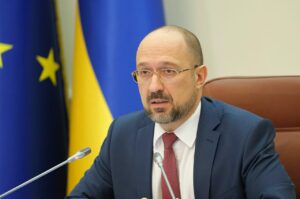
Prime Minister of Ukraine Denys Shmyhal notes interest in developing cooperation with Slovakia in terms of information exchange between the customs authorities of both countries.”The head of the Ukrainian government stressed that Ukraine is interested in developing cooperation with Slovakia in the customs sphere. According to him, one of the topical areas of such cooperation is the exchange of information between the customs authorities of both countries and the implementation of a pilot project for the exchange of preliminary information,” the governmental press service said following a joint visit by Shmyhal and Prime Minister of Slovakia Eduard Heger to the Uzhgorod – Vyshne Nemetske checkpoint on the Ukrainian-Slovak border on Friday.Also, according to the Prime Minister of Ukraine, the issue of concluding agreements with Slovakia remains open, which will allow opening pedestrian and bicycle traffic through the checkpoint Uzhgorod – Vyshne Nemetske. “The relevant protocol is under consideration by the Slovak side. We look forward to a constructive discussion of these issues during our bilateral meetings,” said Shmyhal.

Uzhgorod International Airport received its first flight on Friday in accordance with the intergovernmental agreement signed between Ukraine and Slovakia in September 2020.
According to the press service of the Ministry of Infrastructure of Ukraine, now air traffic control, as well as the use of airspace at a tactical level, will take place in a certain part of the airspace of Slovakia. Non-precision instrument approach procedures will be applied at the Uzhgorod aerodrome.
The ministry said that this agreement was necessary due to the fact that this airport is located in a mountainous area in such a way that the threshold of runway 10 is located a few hundred meters from the Ukrainian-Slovak border. Therefore, the use of the airspace of a neighboring country is a prerequisite for instrument landings at this airfield.
“From today, the possibilities of using the airfield for airlines in Uzhgorod have been expanded. This is the result of Ukraine’s long-term work at the international level, and we expect that it will have a positive effect on the development of air transportation in the region. We see that there is a demand for both international and domestic flights. For example, flights on the route Kyiv – Uzhgorod – Kyiv, restored this summer, almost always take place with full load of seats,” Minister Oleksandr Kubrakov said.
UkSATSE, in turn, said that Ukraine’s ability to manage air traffic in part of the airspace of an EU member state is proved by an updated certificate that the state-owned enterprise received from the EU Aviation Safety Agency (EASA) on August 31, 2021.

The Slovak Republic opens an entrance for Ukrainian citizens who have completed a full course of vaccination against coronavirus (COVID-19), Ukrainian Foreign Minister Dmytro Kuleba has said.
“Slovakia has opened up for Ukrainians who have completed a full course of vaccination. For those who have not yet been vaccinated, entry is possible with self-isolation,” Kuleba said on his Twitter page on Wednesday.

Prime Minister of Ukraine Denys Shmyhal and Prime Minister of the Slovak Republic Eduard Heger agreed on the need to intensify bilateral cooperation.
“Today we have agreed on the need to intensify our bilateral cooperation. Holding the next fifth meeting of the Ukrainian-Slovak combined commission on economic, industrial, scientific and technical cooperation will be an important step in assessing the state of trade between our countries,” Shmyhal said at a joint briefing with Heger in Kyiv on Friday.
In addition, the parties agreed to maximize the use of the transit potential of the countries. Shmyhal also noted that the introduction of joint border and customs control at the border is important for both countries.
Among other things, the parties agreed that cooperation between countries in the field of employment and labor migration requires additional attention from governments.

The presidential offices of Slovakia and Ukraine are working on a declaration recognizing Ukraine’s European integration aspirations, said Prime Minister of Slovakia Eduard Heger.
“Slovakia has been a staunch supporter of Ukraine and her European aspirations of Ukraine. This is one of my main messages today in Kyiv. And we are vocal on that in Brussels as well. Presidential offices of both countries are working on the declaration you mentioned,” Heger said in an exclusive interview with Interfax-Ukraine.
He stressed that Ukraine’s European integration aspirations had already been officially recognized many times.
“For now, it is important to use all the provisions the Association Agreement between the EU and Ukraine offers,” the premier added.
He noted that during his visit to Kyiv on Friday, he would talk with Ukrainian interlocutors about the reforms.
“Indeed, transformation and modernization of the country is a prerequisite for becoming a member of the EU and NATO. The reform process in Ukraine is continuing and Slovakia believes it will be sustainable and successful. Btw, the changes are not about the EU and NATO, they need to be introduced be Ukrainians themselves to make Ukraine stronger, more resilient, to the benefit of all the Ukrainians,” Heger said.

The bilateral agreement on the use of the Slovak airspace by the international airport Uzhgorod will be in effect from June 5, said Prime Minister of Slovakia Eduard Heger.
“There are still some technical measures and procedures to be put in place and you simply cannot make shortcuts. It is about safety and established mechanisms in the air transportation, not about politics. I was informed that all the process will be finished in September,” Heger said in an exclusive interview with Interfax-Ukraine.